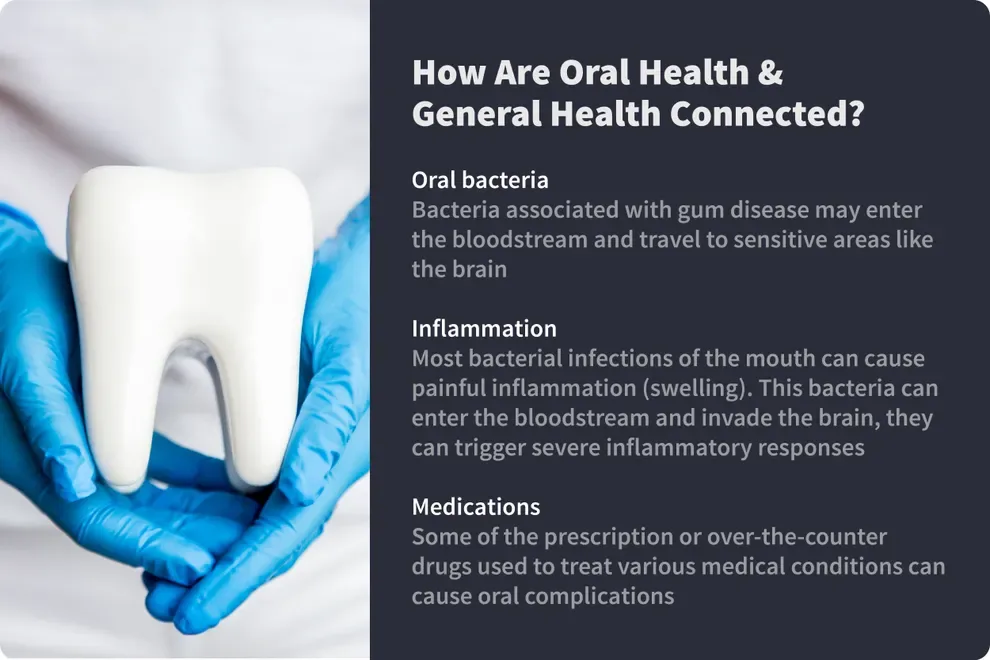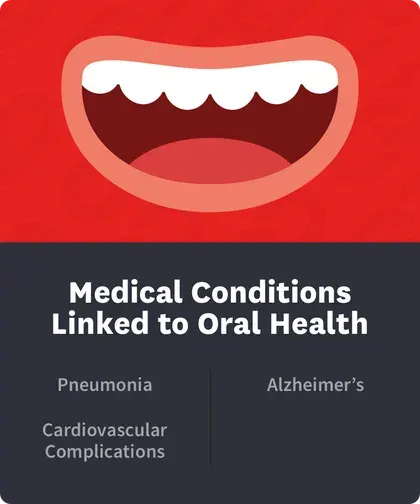Oral Health & General Health: Everything You Need to Know
Table of Contents
- A Two-Way Relationship
- Medical Conditions Linked to Oral Health
- Diseases That Can Impact Your Oral Health
- Oral Health & Your Quality of Life
- Tips for Good Oral Health
- References
Brushing and flossing your teeth every day are vital self-care measures to keep your teeth and gums healthy. Combining these routines with regular dental exams helps prevent multiple dental complications as you get older.
It’s important, too, because researchers believe that good oral health has an even greater significance on overall health: Having healthy teeth and gums delivers a psychological and physical pick-me-up.
When you have excess bad bacteria in your mouth, your heart or even brain health might be at risk. Dental issues like tooth loss or decay have also been linked to problems in other parts of the body.
Understanding the possible connection between common oral issues and other body conditions can help you take better care of your overall health.

The Two-Way Relationship Between Your Oral Health and Overall Health
Scientists propose several ways in which oral health and general wellness may be connected. These include:
Oral bacteria
Inflammation
Medications
Bacterial buildup in your mouth can pose greater danger than just bleeding gums or tooth loss. Notably, bacteria associated with gum disease (periodontitis) may enter the bloodstream and travel to sensitive areas like the brain.
Serious complications can develop in any bacteria-infested part of the body.
Medical Conditions Linked to Oral Health

Various researchers have been observing different patient groups with dental issues like gum disease or cavities for a long time. They have concluded that these problems are closely linked to various medical conditions in many patients.
This conclusion doesn’t necessarily suggest that if you lose a tooth, you’ll eventually get a heart or brain problem. Rather, it means that certain oral/dental issues and general illnesses tend to occur at the same time in many people.
Multiple studies have confirmed this correlation between oral health and other diseases, such as:
As unlikely as it may seem, there’s a connection between missing teeth and heart complications, according to one study. The correlation isn’t far-fetched given that people with conditions that cause tooth loss, such as gum disease, have higher rates of heart attack or even stroke.
There are a couple potential explanations for these surprising observations:
Bacteria entering the bloodstream
Immune response
Bacteria Entering the Blood Stream
The same bacteria that infect the gum can enter blood vessels and cause serious heart issues. Infected arteries or veins may become damaged and inflamed.
Once blood clots start forming inside these vessels, heart attacks can occur. Patients with atherosclerosis (abnormally thick arteries) are at a higher risk of experiencing these cardiovascular incidents and stroke because of the clotting.
Immune Response
Another theory is that inflammation damages blood vessels, leading to heart and brain issues. This occurs after the periodontitis bacteria from the mouth enter your bloodstream.
To protect you from the bacterial infestation, your immune system triggers blood vessel inflammation. This response can cause damage to veins and arteries throughout your body.
If your heart or brain is affected, it will not function properly.
Pneumonia is a painful condition that affects the lungs and causes breathing difficulty. One study linked the viral infection to poor dental hygiene.
Pneumonia becomes a more dangerous condition for patients with the following oral/dental issues:
Multiple cavities
Higher number of missing teeth
Not brushing teeth regularly
Lack of regular dental cleanup at the dentist’s office
Not practicing proper oral hygiene for an extended duration may result in adverse problems such as:
Plaque accumulation
Unhealthy levels of bacteria in saliva
Yeast in the throat (oropharynx colonization)
These adverse effects are seen in patients with severe pneumonia. Some victims with the oral issues may even require hospitalization or intensive care after getting the respiratory infection.
Alzheimer’s is a disease that causes gradual brain damage. Eventually, the victim suffers loss of essential mental functions, including memory.
Now there’s scientific evidence linking Alzheimer’s to gingivitis, another bacterial gum disorder.
Another outcome of inadequate dental hygiene, gingivitis causes your gum to swell around the base of your teeth. While the oral infection is typically mild, the bacteria behind it can have a more devastating impact beyond your mouth.
According to researchers, here’s the link between gingivitis and progressive brain degeneration:
The patient has persistent gingivitis, leading to unhealthy presence of harmful bacteria (gingivalis) in the mouth
From the mouth, gingivalis enter the bloodstream and travel to the brain
The bacteria produce proteins (enzymes) that can slowly destroy brain cells and cell connections
When the nerve cells die, the patient suffers memory loss and develops Alzheimer’s
It’s important to note that this brain condition doesn’t occur at once. Instead, it develops gradually as bacteria in the mouth accumulate.
Left untreated, gingivitis lets more bacteria move to the brain where the microorganisms generate more destructive enzymes. In this study, the deceased people with Alzheimer’s had high levels of the gingivitis-linked proteins in their brain.
Diseases That Can Impact Your Oral Health
The correlation between your overall health and your oral health is bidirectional. As such, some diseases may expose you to dental problems like gum diseases, cavity, or tooth loss.
Some examples:
HIV or AIDs
Diabetes
Alzheimer’s

Tooth loss
Oral thrush
Dry mouth
Mouth ulcers
Canker sores (shallow, painful wounds that may form inside your mouth)
Having HIV or AIDs weakens your body’s ability to fight various diseases and infections. With your immune system compromised, most viruses or bacteria encounter little resistance when they enter your body.
The viral infection can cause painful dental complications if not properly managed, such as gingivitis. While gum disease can affect anyone, HIV patients are more susceptible to its severe symptoms, including gum ulcers and tissue loss.
Other oral issues linked to HIV and AIDs include:
Impact of Oral Health on Your Quality of Life
Living with untreated oral issues can adversely impact your life. Prevention is much better as it lets you enjoy everyday activities or pleasures of life such as:

Eating: Having missing teeth, swollen gums, or painful mouth ulcers can make your meals less enjoyable.
Talking: Numerous dental problems, including crooked or missing teeth, can impact your speech.
Smiling: Misaligned, discolored, or cracked teeth can take your confident, sparkling smile away. This can dent your self-esteem.
Most of these oral problems can reduce your quality of life at home, school, or work. If you lose several working days due to a dental complication, it may affect your finances.
Your education could be impacted if you miss classes to receive treatment. As for social participation, both children and adults with noticeable teeth anomalies usually have minimal, less fulfilling interactions with their peers.
Tips for Maintain Good Oral Health
By maintaining good oral health, you can optimize your overall mental and physical wellbeing. Here are some tips to practice proper oral hygiene:
Brush your teeth at least twice every day using fluoride toothpaste to prevent gum disease, tooth decay, etc.
Floss or clean between your teeth once a day
Avoid tobacco smoking to prevent dental issues like tooth decay
Minimize snacking on sugary foods that could harm your teeth over the long run
Emphasize proper nutrition every day
See your dentist at least twice a year for a comprehensive dental checkup and antibiotic cleanup
In case you need dental treatments like teeth aligners or braces, use custom-fit appliances supplied by a licensed practitioner
Get treated for diseases that expose you to dental issues
If a family member has Alzheimer’s or poor memory, you can remind them to brush and floss their teeth regularly
